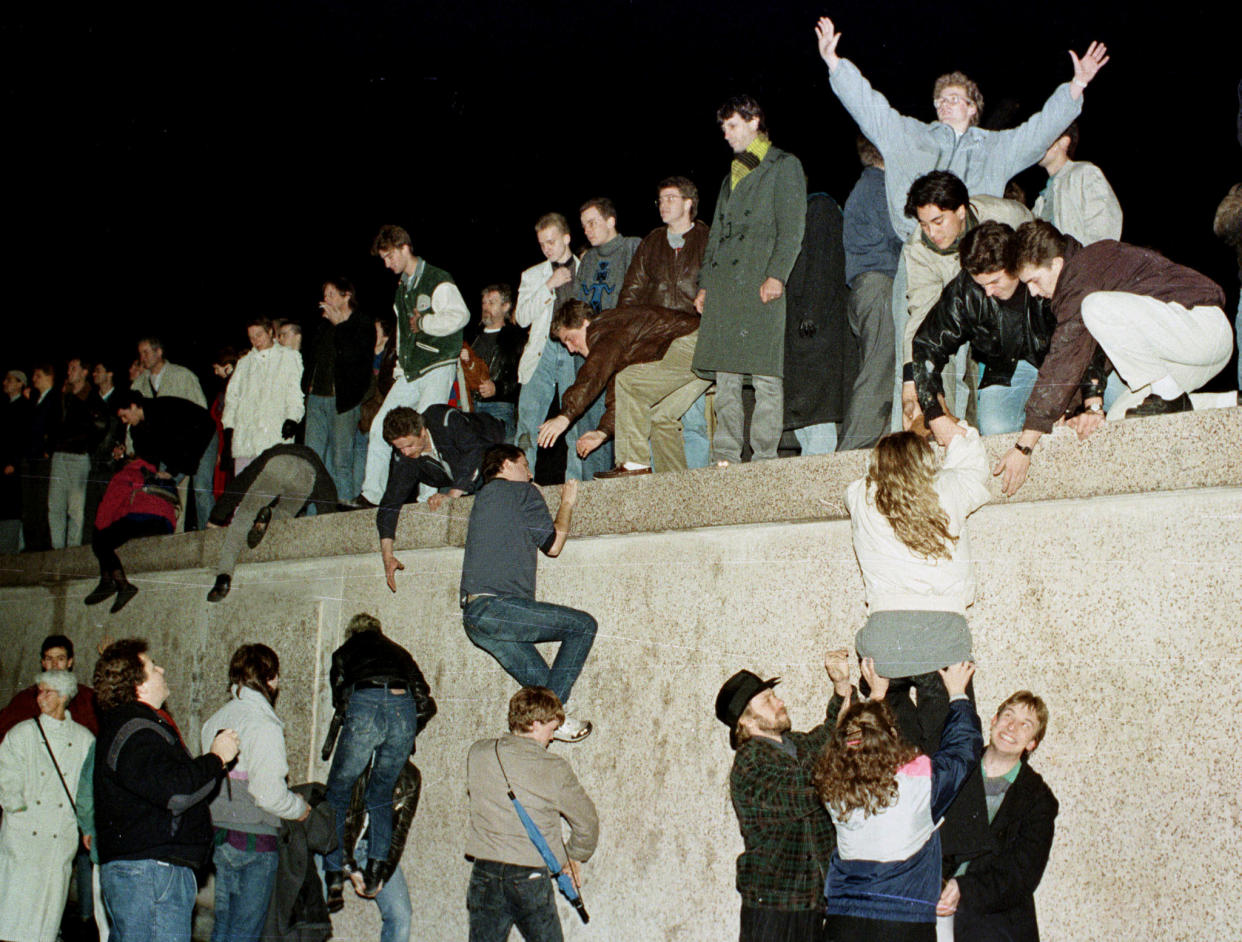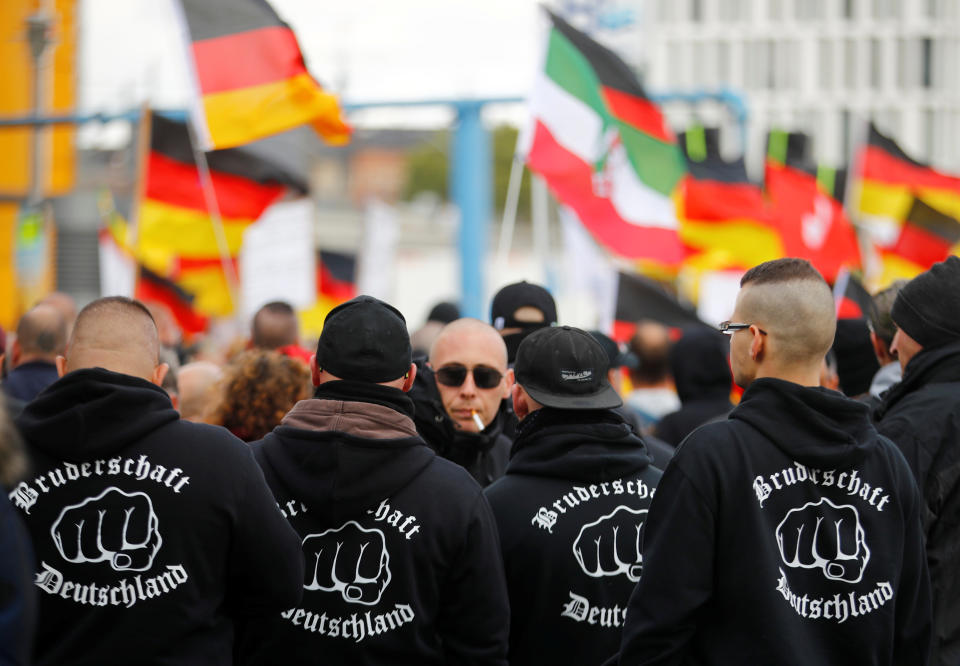A polarised Germany marks 30 years since Berlin Wall fell

On 9 November 1989, East German government spokesman Günter Schabowski announced at a press conference that people would be allowed to travel from the Communist-controlled East into West Germany for the first time since the country was split in 1961.
Journalists asked him if people could now cross from East to West Berlin. Although he did not appear to have an answer he said he believed it was effective immediately. By midnight, a human tide of Berliners was surging across to the western side of the long-divided city.
“For me, the 9th of November 1989 is and will remain a joyous moment in German history,” chancellor Angela Merkel said this week.
The 35-year-old Merkel was at her weekly sauna date on that epic night, and crossed into the West for the first time the next day. The scientist from the former East has now led Germany for 14 of the last 30 years.
Despite being the most economically strong and stable country in Europe, three decades after the barriers fell, the fault lines of division have not vanished in Germany. In some ways, the country appears to be growing as increasingly polarised as the US under Donald Trump and the British are over Brexit.
Some inhabitants of the former Communist-ruled states look back in anger and feel the promise of those heady times after 1989 has not been fulfilled. Two million, mainly younger people have abandoned the East since then. Villages have emptied out and infrastructure and services have become patchier despite the hundreds of billions of euros ploughed into rehabilitating the run-down region.
Wages in eastern regions still lag behind their western counterparts and Germany’s most important companies are based in western and central states. While unemployment is almost as low as in the rest of Germany, a study from the Hans Böckler Foundation’s Institute of Economics and Social Sciences found that wages for employees of same occupation, gender, and experience level were nearly 17% higher in western Germany in 2018. However, it noted that the salary gap had shrunk since 2017 when it stood at 19%.
Second-class citizens

While the economic gap partially explains the ongoing disconnect between the old East and West, studies have shown that people in the eastern regions still see themselves still as different, identifying as “East Germans” first, and “Germans” second.
In September, a government report on the “state of German unity” revealed that 57% of East Germans feel like second-class citizens, and just 38% believed reunification had been a success.
“This dissatisfaction is expressed in the election results in the east and west in recent years which show significant differences,” the report noted.
Feelings of being excluded from the country’s huge success story has left many former eastern states ripe for political radicalisation. The Left Party, which descended from the Communist party, still has a following while at the other end of the spectrum the far-right Alternative for Germany (AfD) party has flourished.
Merkel’s open-door refugee policy during 2015 and 2016 gave the AfD the ammo it needed to stir up complaints that the German leader was more willing to spend money integrating refugees than her constituents in the former East. The party entered the national parliament for the first time in a 2017 general election, and is now the third largest party in the country.
Urging people to “complete the turnaround,” (die Wende) that began with the peaceful revolution of 1989 and seize control of their own destiny, the AfD came second in elections in the eastern German states of Brandenburg, Saxony, and Thuringia this year.
READ MORE: Germany's far-right surges to second place in another state election
Whilst many AFD supporters reject being labelled as “far-right,” there is no doubt this is a radical, nationalist, far-right party—its leader in Thuringia, Björn Höcke, has called Berlin’s Holocaust memorial a "memorial of shame" while party leader Alexander Gauland said "Hitler and the Nazis are just bird shit in more than 1,000 years of successful German history."
“Nazi Emergency”

Earlier this month, city councillors in Dresden, capital of the eastern state of Saxony, declared what it called a “Nazi Emergency,” passing a resolution that said "right-wing extremist attitudes and actions... are occurring with increasing frequency" and calling on the city to help protect minorities and victims of far-right violence.
Dresden is also the birthplace of the PEGIDA (Patriotic Europeans against the Islamisation of the West) movement, which has been holding big rallies in the city since 2014.
Right-wing extremism is not a new thing in eastern states of Germany.
In 1991, neo-Nazis rampaged in the town of Hoyerswerda, attacking temporary workers from Mozambique and Vietnam and asylum seekers’ accommodation. Numerous attacks on refugee centres have taken place since the 2015 refugee influx.
The proliferation of xenophobia in eastern regions has been attributed to the lack of people from other cultures in the Communist-controlled East Germany leading to people being unused to foreigners. Even today, only around 7% of people living in the former East have a migrant background.
Holger Lengfeld of the University of Leipzig told Berlin Policy Journal that research shows that the more migrants living in a city or in a region the less xenophobic people are.
“We assume that this is one of the reasons why people in Eastern Germany are more afraid of the multicultural society than people in Western Germany, because they have no experience of it,” Lengfeld said. He said this explains the paradox that whilst “fewer foreigners live in Eastern Germany, the rejection of the presence of foreigners is stronger.”
Growing xenophobia has also led to an alarming rise in anti-Semitism in Germany, and a 10% rise in anti-Semitic crimes in 2018, from the year before, to a total of 1,799 offenses, ranging from physical harm to verbal abuse to the desecration of Jewish cemeteries.
READ MORE: German criminal police chief: far-right crime is endangering democracy
In October, a 27-year-old German man attacked a synagogue full of worshippers in the city of Halle, in the former East German state of Saxony-Anhalt. Failing to gain entry, the man, who later confessed to right-wing, anti-Semitic motivation, shot dead two local passers-by.
Even if it causes a “shitstorm”
In an interview with Der Spiegel this week, Merkel defended the right of all parties to exist, and for people to speak their minds.
“Freedom of speech includes the freedom to be contradicted,” she said. “I encourage everyone to express his or her opinion, but you must then be ready to have it called into question. Sometimes, there may even be a so-called ‘shitstorm’… It is all part of democracy.”
She noted that life has become free but not necessarily easier for older East Germans.
“As well as the successful regions, there are also those in which the villages are emptying, because children and grandchildren have moved away,” Merkel said. “Still, 30 years later it must clearly be said: Even if you aren't satisfied with public transportation in your area, with medical care, with the state or with your own life, that does not give you a right to be hateful or disdainful of other people, or to resort to violence.“
READ MORE: Behind the Berlin Wall, Angela Merkel had an American dream

